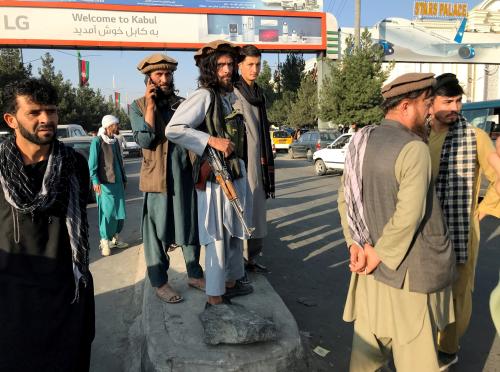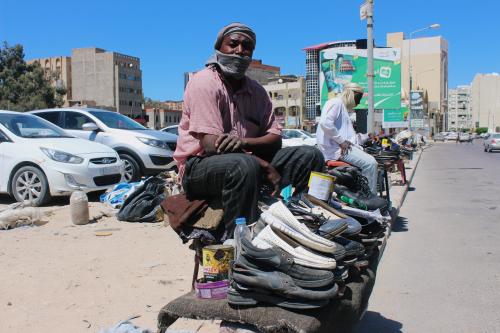This speech was delivered at the first ministerial meeting of the Economic Community of West African States (ECOWAS) on internally displaced persons on July 7, 2011 in Abuja, Nigeria.
I would first of all like to express my profound thanks and debt of gratitude to ECOWAS, the African Union Commission, and the UN family of organizations for inviting me to speak at this important meeting, which is the third I have attended, after Lilongwe and Kinshasa, to promote a continent-wide process of promoting the ratification and implementation of the Kampala Convention. I also sincerely thank the Government of Finland for its support of this meeting and its firm commitment to humanitarian affairs and the cause of internally displaced persons.
My mandate on the human rights of IDPs welcomes the First Ministerial Conference on humanitarian assistance and internal displacement in West Africa. I am happy and ready to cooperate and work with the ECOWAS Commission, the African Union Commission, the Member States, and civil society, to protect and assist internally displaced persons in Africa, and to find durable solutions to their plight.
The situation of internally displaced persons affects the stability of states because a stable state in international law is built on a stable population.
In this context, the Kampala Convention provides a framework for dealing with the problem of displacement in Africa. Therefore, I would like to underscore the importance of achieving the necessary ratifications to bring the Convention into force and to bring about its effective implementation at national, regional, and international levels.
In fact, this is one of the priorities of my mandate. It will be recalled that the Convention obliges respect for the mandates of the African Union and the United Nations in providing protection and assistance to internally displaced persons in accordance with international law. My mandate will remain truthful and faithful to this obligation, as the basis for cooperating and working with the African Union and ECOWAS to whom I remain grateful for their support of the mandate.[1]
Hon Ministers, in 1969, Africa pioneered the group-based approach to the protection of refugees in the context of African problems by adopting the African Union Convention Governing the Specific Aspects of Refugee Problems in Africa. In 1981 Africa adopted its Charter on Human and Peoples’ Rights in which the right to a satisfactory environment was included—a provision that now stands out as forward looking, given the growing importance of climate change the world over.
But today, Africa should stand tall and proud for showing leadership in the world by initiating the preparation and adoption of the first legally binding instrument to protect and assist IDPs alongside refugees.
Of the more than 30 million internally displaced persons in the world’s internally displaced persons, more than 6 million are in Africa. The continent has responded to this problem with great commitment, vision, and vigor represented and symbolised in the Kampala Convention, and for which I congratulate the Union, and particularly the leadership shown by H.E. Julia Joiner, and the Member States.
I associate myself with the remarks made by my brother Mr. Chris Ache with respect to the outstanding role Her Excellency Joiner has played in bringing about the birth of the Kampala Convention and, now, in pioneering the ratification and implementation of the Convention. As one who has worked with her for some years, I am aware of her truly remarkable abilities and commitment to the cause of Africa. I would like to pay tribute to her as she completes her term of work at the African Union, and I hope that we have not seen the last of her or of her work.
But I also warmly congratulate the Member States of ECOWAS for their effective participation and support in the process that led to the adoption of the Convention.
By Executive Council Decision 129(V) of 2004, the Executive Council of the African Union requested the African Union Commission to elaborate a legal framework for the protection and assistance of internally displaced persons in Africa.
Shortly before that, the eleven Member States of the International Conference for the Great Lakes Region, the majority of whom are in Central and East Africa, had begun to deliberate on a Protocol for the Protection and Assistance to Internally Displaced Persons, which they adopted in Nairobi in 2006. In the same period, ECOWAS convened a regional conference on internally displaced persons with a view to concluding a Protocol.[2] These processes were mutually reinforcing.
The preparation of the Convention started with a Concept Note that was presented to and discussed by a group of experts in 2005. An annoted framework of the Convention was prepared at the same meeting. We should recall with fond memories that it was in this region, in Burkina Faso, that this annoted framework of the Convention in preparation was adopted by the Second AU Ministerial Conference on Refugees and IDPs in May 2006.
With that green light, the drafting of the Convention then began and was negotiated by an Expert Group of Legal experts of the Member States, including those from ECOWAS from 2007-8, after which the text was adopted by the 3rd AU Ministerial Conference on Refugees and IDPs in Addis Ababa.
Unusually, and as a testimony to the importance of the Convention, the text adopted by the 3rd AU Ministerial Conference on Refugees was opened for discussion by the Executive Council of Foreign Ministers of the AU, and indeed by the AU Special Summit of Heads of State on Refugees, Returnees and IDPs, until it’s adoption by the same Summit in Kampala in October 2009.
Upon adoption, the Convention was immediately open for signature and ratification by the Member States. These are the important reasons to move rapidly with the ratification and implementation of the Convention.
The Convention was widely and laboriously negotiated to represent and reflect the position of the Member States as regards the protection and assistance to be accorded to internally displaced persons in Africa.
The negotiation process was conducted with a view to achieving consesus, common understanding, and even agreement, on the provisions of the Convention. Where consensus was not reached, the draft provisions were bracketed until accommodating language was reached.
The provisions on armed groups were such an example. Where consesus was not reached, the draft provisions were gradually removed from the text, such as those on lack of development induced displacement.
Flowing from this, it is clear that African States have ownership of the Convention and should strive to make it work to express the political will for which it was formulated, negotiated, and adopted.
Moreover, the Convention is an international model for protecting and assisting IDPs as well as those displaced by climate change. The pride of Africa in presenting the Convention as a model should be followed by real deeds of action to combat displacement by complying with the standards of the Convention, and by adopting implementing national legal and policy frameworks envisaged in Article 3(2) of the Convention.
The substantive aspects of the Convention correspond more directly to the commitment of African States to address the problem of displacement and also capture the responsibility of non- state actors as a modern approach to accountability in treaty making.
The Preamble recognizes the magnitude of the phenomen of displacement, including that caused by natural disasters, lays out the vision of the Member States to tackle displacement, and makes reference to the founding legal instruments on which it is based, e.g., the UN Charter, the AU Constitutive Act, and the Guiding Principles on Internal Displacement, which balance state sovereignty with state responsibility to protect and assist IDPs.
The objectives of the Convention to address and combat the problem of displacement in Article 2 are a measure of its operationalization and underlie the entire fabric of the Convention. They are the basis for the general obligations assumed by States Parties in Article 3 to respect and ensure respect for the Convention, and incorporate its obligations into domestic law.
The Convention was designed to relate and respond to all phases of internal displacement. It articulates obligations of the states parties in terms of preventing the conditions contributing to displacement, protection and assistance during displacement, and offers durable solutions to end displacement. The Convention also addresses the role of the AU, international organizations, humanitarian agencies and armed groups in preventing and responding to internal displacement.
In seeking to promote the ratification and implementation of the Convention, it is important to keep in mind these salient aspects, which reflect the vision and overall resolve of African States and peoples to deal with internal displacement.
The Convention is primed to enter into force upon being ratified by fifteen States. There are twelve ratifications so far and three more are needed to bring the Convention into force. I sincerely hope, and this is the challenge I place before the Hon. Ministers from ECOWAS Member States, that the Convention will receive at least three ratifications by the end of this meeting.
Domestication and implementation will require the formulation of a strategic policy by a line ministry, in collaboration with other line Mimistries, and relevant stake holders, including the UN and civil society.
I am hopeful that ECOWAS Member States will illuminate the path to the implementation of the Kampala Convention. Just as Kampala was the place of adoption, Abuja could claim a historical legacy by becoming the place where the Convention may enter into force under the auspices of ECOWAS.
Each one of us has a calling to the cause of our time, and it is for each one of us to answer the call at the time of calling. That time is now and I sincerely believe that ECOWAS will answer that call with African pride.
I thank you very much.
[1] See UN Human Rights Council Resolution A/HRC/RES/14/6, available at: www2.ohchr.org/english/issues/idp/mandate.htm
[2] The ‘First Regional Conference on Internal Displacement in West Africa’ was hosted by the Government of Nigeria in Abuja For further information and materials in French and English related to the conference, including the conference report, see: brookings-edu-2023.go-vip.net/projects/idp/contents.aspx


Commentary
Implementation of the African Union Convention for the Protection and Assistance of Internally Displaced Persons (IDPs) 2009 (The Kampala Convention)
July 7, 2011